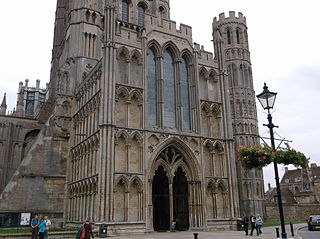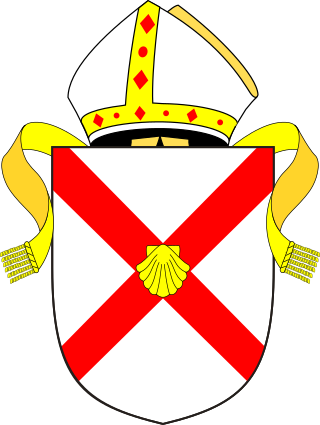Related Research Articles
Geoffrey Ridel was the nineteenth Lord Chancellor of England, from 1162 to 1173.

Eustace was the twenty-third Lord Chancellor of England, from 1197 to 1198. He was also Dean of Salisbury and Bishop of Ely.

William of Kilkenny was a Lord Chancellor of England and Bishop of Ely.
Philip of Poitou was Bishop of Durham from 1197 to 1208, and prior to this Archdeacon of Canterbury.
John Kirkby was an English ecclesiastic and statesman.
Walter d'Eynsham, also known as Walter de Hempsham was a medieval Archbishop of Canterbury-elect.

The Bishop of Rochester is the ordinary of the Church of England's Diocese of Rochester in the Province of Canterbury.
John Blund was an English scholastic philosopher, known for his work on the nature of the soul, the Tractatus de anima, one of the first works of western philosophy to make use of the recently translated De Anima by Aristotle and especially the Persian philosopher Avicenna's work on the soul, also called De Anima. He taught at Oxford University along with Edmund of Abingdon. David Knowles said that he was "noteworthy for his knowledge of Avicenna and his rejection of the hylomorphism of Avicebron and the plurality of forms.", although the problem of the plurality of forms as understood by later scholastics was not formulated explicitly in Blund's time. Maurice Powicke calls him the "first English Aristotelian."
William of St. Barbara or William of Ste Barbe was a medieval Bishop of Durham.
Walter of Kirkham was a medieval English official who held the positions of Keeper of the Wardrobe, Dean of York, and Bishop of Durham. He was elected bishop over Aymer de Valence, 2nd Earl of Pembroke, the brother of King Henry III. As bishop, he was instrumental in the founding of Balliol College in the University of Oxford.
Robert of Holy Island was a medieval Bishop of Durham.
William Chillenden, also known as Adam of Chillenden, was a monk at Christ Church Priory, Canterbury, and treasurer of that priory when he was elected Prior of Christ Church in 1263.
Simon Langton was an English medieval clergyman who served as Archdeacon of Canterbury from 1227 until his death in 1248. He had previously been Archbishop-elect of York, but the election was quashed by Pope Innocent III.
William Langton was a medieval English priest and nephew of Archbishop Walter de Gray. William was selected but never consecrated as Archbishop of York and Bishop of Carlisle.
Ranulf of Wareham was a medieval Bishop of Chichester.
Robert of York was a medieval Bishop of Ely-elect.
John of Fountains was a medieval Bishop of Ely.
Ralph Walpole was a medieval Bishop of Norwich and Bishop of Ely.
John Salmon was a medieval Bishop of Norwich.

Richard Marsh, also called Richard de Marisco, served as Lord Chancellor of England and Bishop of Durham.
References
- Fryde, E. B.; Greenway, D. E.; Porter, S.; Roy, I. (1996). Handbook of British Chronology (Third revised ed.). Cambridge, UK: Cambridge University Press. ISBN 0-521-56350-X.
- Greenway, Diana E. (1971). "Canterbury: Archbishops". Fasti Ecclesiae Anglicanae 1066-1300. Vol. 2: Monastic Cathedrals (Northern and Southern Provinces). Institute of Historical Research. Retrieved 6 November 2007.
- Greenway, Diana E. (1971). "Canterbury: Priors". Fasti Ecclesiae Anglicanae 1066-1300. Vol. 2: Monastic Cathedrals (Northern and Southern Provinces). Institute of Historical Research. Retrieved 11 September 2007.